Invictus here, folks:
Occupy Wall Street has been the subject of debate with friends and colleagues. Some confusion and misconceptions are out there regarding the protesters’ message: I’ve heard that the OWS movement is anti-capitalist, anti-Semitic, Pro-Socialist, Pro-Marxist, or a combination thereof. Or that they’re just — as Atrios re-popularized the phrase long ago — Dirty F*ckin’ Hippies.
As Barry has described it, “there is an unfocused financial rage in the United States” — and you see it in both the Tea Party and the OWS movement. Rather than mischaracterize why so many Americans — on the Left and the Right — are unhappy, let’s go to the actual data to see what is underlying this negative general sentiment:
Gini Index
Let’s start with the Gini Index, “the degree of inequality in the distribution of family income in a country.” Here’s our place in the world:

Source: CIA Factbook
>
By way of comparison, Germany is #126 (of 136) with a Gini Index of 27, and Japan is #76 at 37.6.
Within the United States, this is what income inequality looks like from a Gini Index perspective:
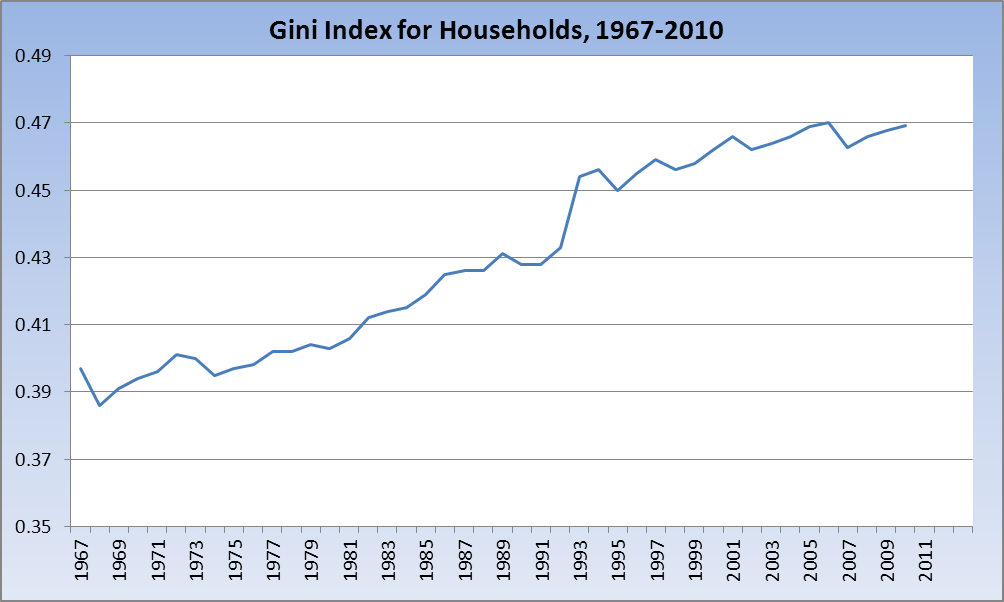
Source: Census.gov, Table H.4
>
Well, How’d the Gini Index Get So Out of Whack?
In brief (footnotes removed):
In recent decades, CEO pay has grown dramatically in the United States. Between the 1930s and the 1970s, CEOs of the largest companies received approximately $1 million in total annual compensation (adjusted for inflation in year 2000 dollars). During this period, the ratio of CEO-to-worker pay narrowed as workers’ wages grew and CEO pay rose modestly. By the 1990s CEO pay grew dramatically. Business Week estimated that CEO pay at the largest companies grew from 42 times the average worker’s pay in 1980 to 531 times the average worker’s pay in 2000. In 2010, large company CEOs received $11.4 million, or 343 times worker pay, according to calculations by the AFL-CIO’s Executive Paywatch website.
Here are some additional tables on how executive compensation has skyrocketed over the past few decades. Additionally, I’m sure Warren Buffett’s quote resonates with OWS (frankly, it should resonate with everyone — Tea Party included): “Too often, executive compensation in the U.S. is ridiculously out of line with performance. Getting fired can produce a particularly bountiful payday for a CEO. Indeed, he can “earn” more in that single day, while cleaning out his desk, than an American worker earns in a lifetime of cleaning toilets. Forget the old maxim about nothing succeeding like success: Today, in the executive suite, the all-too-prevalent rule is that nothing succeeds like failure.”
A $1MM reduction in a CEO’s pay could be used to fund 13 jobs at $75k/year; nothing too complex about that math. Here are other jobs that could be created if we addressed the disparity.
Meanwhile, while CEOs and other executives have feathered their nests — largely by exploiting overly-friendly relationships with all-too-compliant boards to negotiate outrageous compensation and severance packages — things have not been going quite as well for the rest of the country, as those at the top continue to rise while the remainder continue to drift:
What About Everyone Else?
While the top 1% have been doing just fine, thank you, median incomes have gone nowhere in over a decade while both poverty and food stamp usage have both been on the rise. Further, labor’s share of the spoils has fallen to all-time lows:
(NOTE: BLS provides (and FRED captures) this series as an Index, not a Level, with 2005 = 100. BLS advises me that the 2005 Level = 60.6. Therefore, I have taken the entire Index (Series identified above) and multiplied it by .606 to get the percent Labor Share above.)
While labor’s share has been in decline, output has been outstripping compensation (natural log scale):
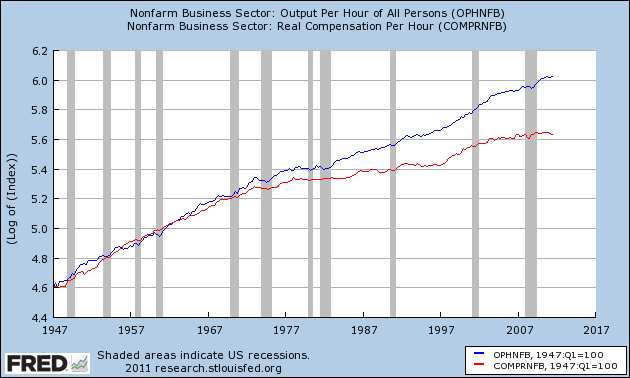
(Source: Monthly Labor Review, January 2011, Susan Fleck, John Glaser, and Shawn Sprague)
>
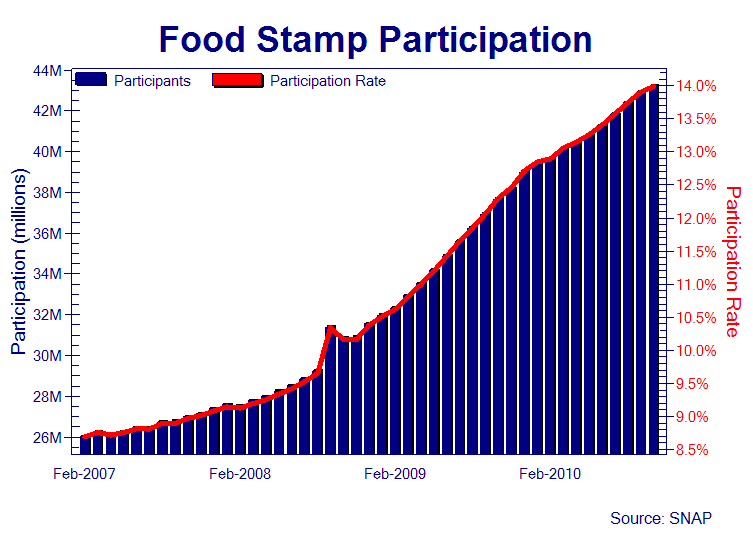
Source: SNAP via ZeroHedge
>
There’s been yet another resurfacing of a canard that goes something like this: An acknowledgement that there’s income inequality followed immediately by the claim that it’s not inequality that matters, but income mobility. Two examples of that argument can be seen here and here. It is refuted here, here and here, that last link being fully one decade old, showing how zombie lies truly never die.
I have yet to see any signs or read any reports of any of the socialist OWS protesters demanding that Personal Current Transfer Receipts — money literally “transferred” by the government to citizens under programs like the Big Three, Unemployment Insurance, and Veterans’ Benefits — be a higher percentage of income than it already is. Have you? To the contrary, actually. I’m relatively sure OWS would like nothing more than to see this chart reverse — to have the government provide less to the people because the people are doing more for themselves.
Other Factors
Some comments on aspects of the OWS movement that are difficult, if not impossible, to quantify. I think Americans have an inherently good and reasonable sense of fair play. We’re not a people who begrudge others their wealth fairly earned — with “fairly earned” being the operative phrase. I haven’t heard many folks railing about Bill Gates, Warren Buffett or Steve Jobs. I have — and do — hear folks clamoring about the likes of Angelo Mozilo, Stan O’Neal, Lloyd “God’s Work” Blankfein. Why does Rob Gillette, former CEO of First Solar Corp., walk away with almost $40MM for 15 months (~$10,000/hr if he worked 60-hour weeks) at the helm during which the price of FSLR’s stock declined by some 60 percent? (Answer: See above quote from Warren Buffett.)
From the Wired piece linked to below:
When the rich do something to deserve their riches, nobody complains; that’s just the meritocracy at work. But when those at the bottom don’t understand the unequal distribution of wealth — when it seems as if the winners are getting rewarded for no reason — they get furious. They doubt the integrity of the system and become more sensitive to perceived inequities. They start camping out in parks. They reject the very premise of the game.
Personally, I’d argue that it’s generous to state that winners were “rewarded for no reason.” The facts at hand tell us that many have been rewarded for, at the very least, tanking our economy, and at worst criminal behavior; “no reason at all” would be an uptick.
Americans don’t condone making crappy products and then pawning them off on unsuspecting buyers, a la Goldman Sachs, et al: “Boy, that Timberwolf was one shitty deal.” In the real world, companies are held accountable for even inadvertently producing a defective product. On Wall St., doing so is apparently grounds for a round of yucks and an outsized bonus. Personally, I believe Americans have always known the system is rigged, but it wasn’t too rigged, and while prosperity wasn’t necessarily equally shared (nor should it have been), its division was such that everyone (more or less rightly) felt as if they were benefiting. Those days are gone, the illusion of any fairness stripped away, as it’s now clear that for some enough is simply not enough. It’s as though the parasites have inexplicably (and counter to their own self-interests) determined that it’s time to kill the host, but the host is determined to live on.
I believe that OWS would also like to see corporate money out of politics, as we all should. I’ll repost below a comment by Teddy Roosevelt in 1906:
As a nation we still continue to enjoy a literally unprecedented prosperity; and it is probable that only reckless speculation and disregard of legitimate business methods on the part of the business world can materially mar this prosperity. […]
I again recommend a law prohibiting all corporations from contributing to the campaign expenses of any party. Such a bill has already past one House of Congress. Let individuals contribute as they desire; but let us prohibit in effective fashion all corporations from making contributions for any political purpose, directly or indirectly.
OWS also might not have come to pass had financial institutions, in particular, not forgotten who bailed them out a mere three years ago and returned so quickly, and with such belligerence, to their bad behavior and bonus-happy ways. A bit of humility would have gone a long way with the American people, but none was forthcoming. As with all of corporate America, the needs of the shareholders, followed closely by the needs of the corporate executives, trumped any need to be decent corporate citizens. The “heads we win, tails you lose” mindset is still very much with us.
And yes, I believe the Occupy movement would do well to situate itself outside the Capitol and the White House, neither of which have done much to change the nation’s trajectory. As John Adams so eloquently put it:
In my many years I have come to a conclusion that one useless man is a shame, two is a law firm, and three or more is a congress.
Adams is probably spinning in his grave over the uselessness of our current crop of 535, which recently found among its top priorities passing legislation reaffirming “In God We Trust” as our national motto. Important stuff, especially given the fact that no one had proposed abandoning or changing the phrase in the first place.
In summary, then, OWS is not about any one thing that is wrong with either our economic or political system. It is about the many things that are wrong with both and, more to the point, the way the ills of each are exacerbating the ills of the other in a very negative feedback loop. Their message is infinitely more complex and nuanced than, say, “End the war in [insert opponent(s) here].” Right now, we’re getting the worst of both worlds — a crappy economy coupled with crappy politicians trying to fix it (though to be fair many are only pretending). As we all well know, it’s very hard to get your message across when it doesn’t fit on a bumper sticker:
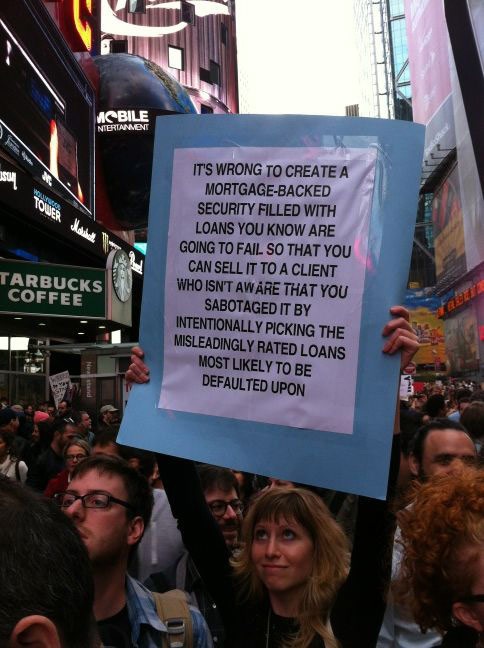
Source: How OWS Cost Me My Job, Caitlin Curran
>
My bottom line: OWS is not anti-capitalist, anti-Semitic, socialist or Marxist. It is about restoring the unfortunate but somewhat necessary accepted degree of unfairness/inequality that prevailed in this country for generations and, importantly, about demanding that the rule of law be applied uniformly (a quaint notion that exited stage “right” during the Bush administration and remains MIA during Obama’s) and not selectively on the masses while the political and Wall St. elites run amok.
Also: Excellent comprehensive coverage of OWS at Fast Company.
~~~
Catch up with me on Twitter @TBPInvictus.

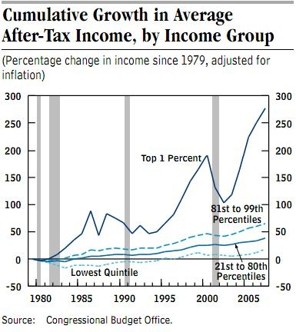

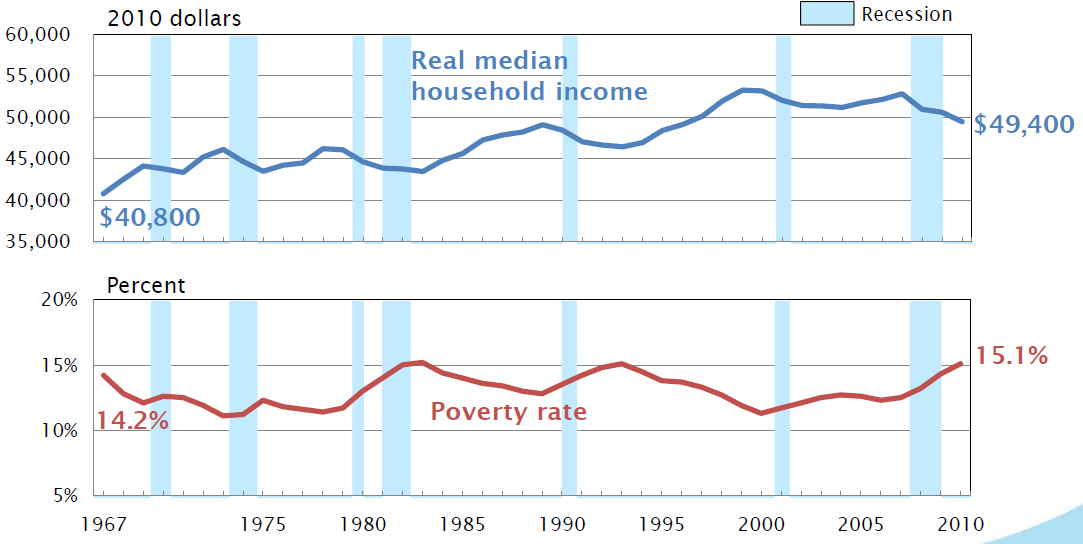
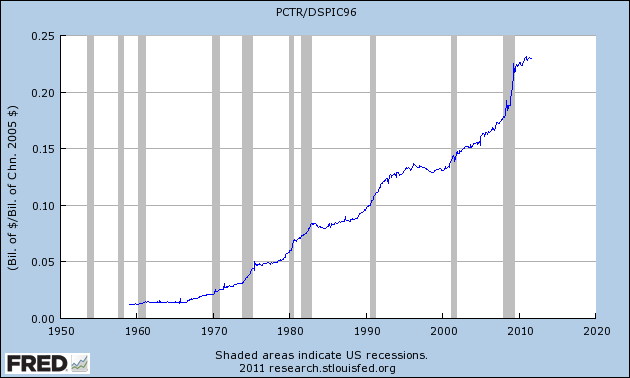

What's been said:
Discussions found on the web: